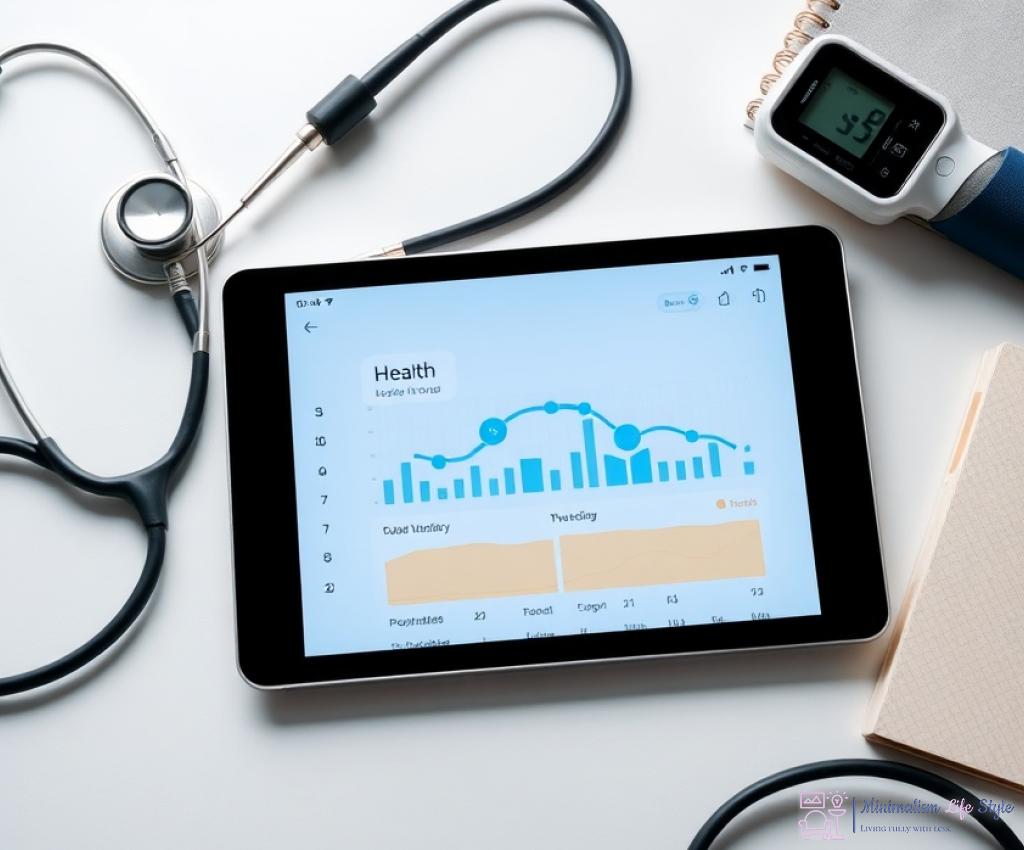Streamlining Your Symptoms: The Essentials of Health Tracking

The Power of Tracking Your Health
In today’s fast-paced world, managing health concerns can often feel overwhelming. With countless symptoms to monitor, medications to remember, and appointments to schedule, it’s easy to lose track of what truly matters. By streamlining your health tracking, you can declutter your medical information and focus on the essentials. This minimalist approach not only enhances your awareness but also empowers you to communicate more effectively with healthcare providers.
Identifying What to Track
Before you dive into the world of health tracking, it’s crucial to identify the most significant symptoms that impact your daily life. Not all symptoms require equal attention; some may be fleeting or trivial, while others could indicate a more serious issue. By concentrating on the symptoms that matter most to you, you can simplify your health management and avoid unnecessary stress.
Here’s a concise list of key symptoms to consider tracking:
- Chronic pain (type and intensity)
- Fatigue levels (daily energy fluctuations)
- Sleep quality (hours and restfulness)
- Mood changes (frequency and triggers)
- Medication adherence (dosage and timing)
Choosing the Right Tools for Tracking
Once you’ve pinpointed the essential symptoms to track, it’s time to select the right tools for the job. The market offers a variety of options ranging from digital apps to traditional pen-and-paper journals. Each method has its benefits and drawbacks, so it’s essential to choose one that fits your lifestyle and preferences. For instance, if you’re tech-savvy and always on the go, a mobile app may suit you best. Alternatively, if you prefer the tactile experience of writing, a journal could be your ideal solution.
| Tracking Method | Pros | Cons |
|---|---|---|
| Mobile Apps | Convenient, Easily shareable with doctors, Customizable reminders | Battery-dependent, Privacy concerns |
| Paper Journal | Tactile experience, No tech required, Personalization | Less shareable, Prone to loss or damage |
By adopting a minimalist approach to health tracking, you can efficiently manage your symptoms and create a clearer picture of your overall health. This streamlining process not only declutters your medical information but also fosters a deeper understanding of your body’s signals.
Cutting Through the Noise: Evaluating Medical Advice Effectively

In a world saturated with health information, discerning valuable medical advice can feel like searching for a needle in a haystack. It’s essential to navigate the complexities of medical guidance with clarity and purpose, especially as you strive to simplify your health management. By honing your ability to evaluate medical advice, you can confidently make informed decisions that resonate with your health goals and personal values.
Understanding the Source is the first step in filtering out noise from the valuable insights. Not all medical advice is created equal; some recommendations stem from reputable professionals with extensive experience, while others may originate from less credible sources. When evaluating medical advice, consider the credentials of the person providing the information. Are they a certified specialist in their field? Have they published peer-reviewed studies? By prioritizing advice from qualified practitioners, you can ensure that the recommendations you follow are grounded in science rather than hearsay.
The next crucial element is assessing the relevance of the advice to your unique situation. What works for one person may not be suitable for another, especially in the realm of health where individual differences play a significant role. Therefore, ask yourself how the advice aligns with your symptoms, lifestyle, and overall health goals. If something feels off or overly complex, it might be worth seeking a second opinion or further clarification. This personalized approach helps you avoid information overload while ensuring that you remain focused on what truly matters.
Finally, trust your instincts when processing medical advice. After conducting your research and consulting with professionals, it’s vital to listen to your body and intuition. If a particular treatment or recommendation doesn’t sit well with you, don’t hesitate to explore alternatives. Your health journey is just that—yours. By developing a strong sense of self-awareness, you empower yourself to make decisions that resonate deeply, leading to a more fulfilling health experience. In this way, cutting through the noise of medical advice is not just about acquiring information but engaging in a dialogue with yourself about what is best for your well-being.
Less is More: Simplifying Your Medication Regimen

In the quest for a healthier life, medications often play a crucial role. However, the complexity of managing numerous prescriptions can create chaos rather than clarity. Simplifying your medication regimen is not just about reducing the number of pills you take; it’s about enhancing your overall health experience. By adopting a minimalist approach to your medications, you can focus on what truly matters, ensuring that each medication serves a purpose and fits seamlessly into your lifestyle.
Rethinking Your Medication List
Begin by taking a good look at your current medication list. Are there medications that no longer serve their intended purpose? Engaging in an open dialogue with your healthcare provider can reveal opportunities to streamline your regimen. Discuss the necessity of each medication and explore alternatives that may be more effective or easier to manage. This process of evaluation not only declutters your pillbox but also fosters a deeper understanding of how each medication impacts your health. By identifying redundancies or outdated prescriptions, you can create a more focused approach to your treatment.
Creating a Cohesive Routine
Once you’ve streamlined your medication list, the next step is to establish a cohesive routine that promotes adherence and reduces confusion. Consider integrating your medications into daily habits, such as pairing them with meals or other rituals you already practice. This integration transforms medication taking from a chore into a natural part of your day. Additionally, using pill organizers can help keep track of what you need to take and when, minimizing the risk of missed doses. Remember, consistency is key; the more straightforward your regimen, the easier it is to maintain.
Embracing Technology for Simplification
In our tech-driven world, there are numerous tools designed to assist in medication management. From smartphone apps that send reminders to digital health trackers that monitor your adherence, technology can be a powerful ally in simplifying your regimen. These tools not only provide organization but also offer valuable insights into your medication patterns, enabling you to make informed adjustments. However, it’s essential to choose solutions that resonate with your preferences and lifestyle. Embrace technology as a companion in your health journey, but ensure it aligns with your minimalist approach, focusing solely on what enhances your experience.
Ultimately, the goal of simplifying your medication regimen is to foster a sense of clarity and empowerment. By thoughtfully evaluating your medications, establishing a cohesive routine, and leveraging technology, you can transform your health management into a streamlined process that prioritizes your well-being. Remember, less truly can be more when it comes to your health.
Health Information Overload: Finding Reliable Sources
In the age of information, where every click brings a cascade of medical advice, finding reliable sources can feel like navigating a labyrinth. You may find yourself bombarded with various health opinions, studies, and personal anecdotes, making it difficult to discern what truly matters for your well-being. However, with a clear strategy, sifting through this overload can lead you to informed decisions that enhance your health journey.
First and foremost, recognizing the difference between credible sources and dubious claims is vital. Look for established medical organizations, such as the Mayo Clinic, World Health Organization, or the Centers for Disease Control and Prevention. These institutions not only provide evidence-based information but also adhere to rigorous standards of accuracy and reliability. When you encounter health information, always ask: Is it supported by research? Are the findings published in peer-reviewed journals? This critical thinking process is essential in your quest for clarity amidst the chaos.
Evaluating the Authoritative Voice
As you explore different sources, it’s essential to evaluate the qualifications of the authors behind the information. Are they healthcare professionals with relevant expertise? Have they conducted research in their field? Understanding the background of the author can help you determine the trustworthiness of the information presented. For instance, a blog post written by a certified dietitian carries weight compared to one penned by an anonymous contributor. This discernment is crucial in building a foundation of reliable health knowledge.
Comparing Multiple Perspectives for Informed Decisions
In your pursuit of reliable health information, consider the value of comparing multiple perspectives. While one source may provide a compelling argument, exploring differing viewpoints can enhance your understanding. This process not only helps identify potential biases but also exposes you to a broader range of insights. Create a mental or physical table that lists key points from various sources, highlighting similarities and differences. This comparative approach allows for a more rounded view of health topics and fosters informed decision-making.
| Source Type | Authority Level | Potential Risks |
|---|---|---|
| Peer-reviewed Journals | High | Limited accessibility |
| Reputable Health Organizations | High | Generalized advice |
| Health Blogs | Varies | Possible misinformation |
| Social Media Posts | Low | High risk of misinformation |
Ultimately, by strategically navigating the overwhelming landscape of health information, you empower yourself to make choices that resonate with your personal health goals. This minimalist approach not only declutters your mental space but also enhances your capability to engage in meaningful conversations with healthcare providers. Remember, clarity in your health journey stems from a foundation built on reliable information, rigorous evaluation, and a commitment to seeking out the truth amidst the noise.
Minimalist Mindset: Stress Reduction and Mental Clarity in Health Management
The Power of a Minimalist Mindset
Embracing a minimalist mindset in health management can lead to profound benefits, particularly in terms of stress reduction and mental clarity. When we declutter our health concerns, we free ourselves from the overwhelming noise of information that often clouds our judgment and increases anxiety. By focusing on what truly matters, we can create a sense of peace and empowerment in our health journey. This approach allows for a more intentional and thoughtful engagement with our well-being, leading to better health outcomes.
Transformative Techniques for Clarity
To cultivate a minimalist mindset, it’s essential to employ transformative techniques that promote clarity. Start by identifying the core aspects of your health that require attention and prioritize these areas. By doing so, you can eliminate distractions and unnecessary worries that contribute to mental clutter. Consider employing practices such as journaling to document your health experiences, which can help in recognizing patterns and triggers without feeling overwhelmed.
Additionally, engaging in mindfulness practices, such as meditation or deep-breathing exercises, can significantly enhance mental clarity. These practices not only serve as a momentary escape from stress but also enable you to process your health information more effectively, fostering a balanced perspective. When you clear your mind, you create space for insightful reflections that guide your decision-making process.
Building a Supportive Environment
Creating a supportive environment is crucial in maintaining a minimalist approach to health management. Surround yourself with reliable resources and supportive individuals who align with your health goals. This could include healthcare professionals who provide evidence-based advice, as well as friends and family who encourage your journey toward simplicity. Establishing boundaries with sources of information that induce anxiety or confusion is essential; instead, seek out clear and concise materials that resonate with your personal experience.
Ultimately, adopting a minimalist mindset is not merely about reducing the physical clutter of medical information but also about cultivating a holistic approach to your well-being. When you prioritize mental clarity and stress reduction, you empower yourself to take charge of your health in a way that feels manageable and fulfilling. By embracing simplicity, you can navigate your health concerns with confidence and grace, transforming challenges into opportunities for growth.




